Life at Berklee:
Isaku in Berklee with Amelia Sophia Ali, Hiroshi Tokieda, Hirokazu Suyama.
Life at Berklee
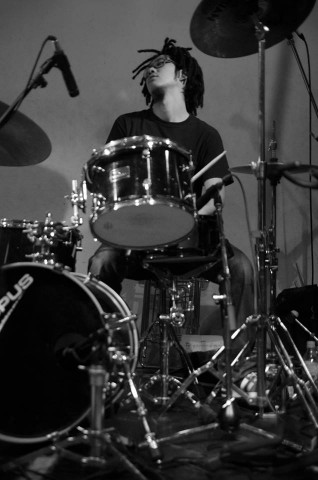
The Yuricane _ our theme song of sorts by Yuri Kageyama: “we are one”
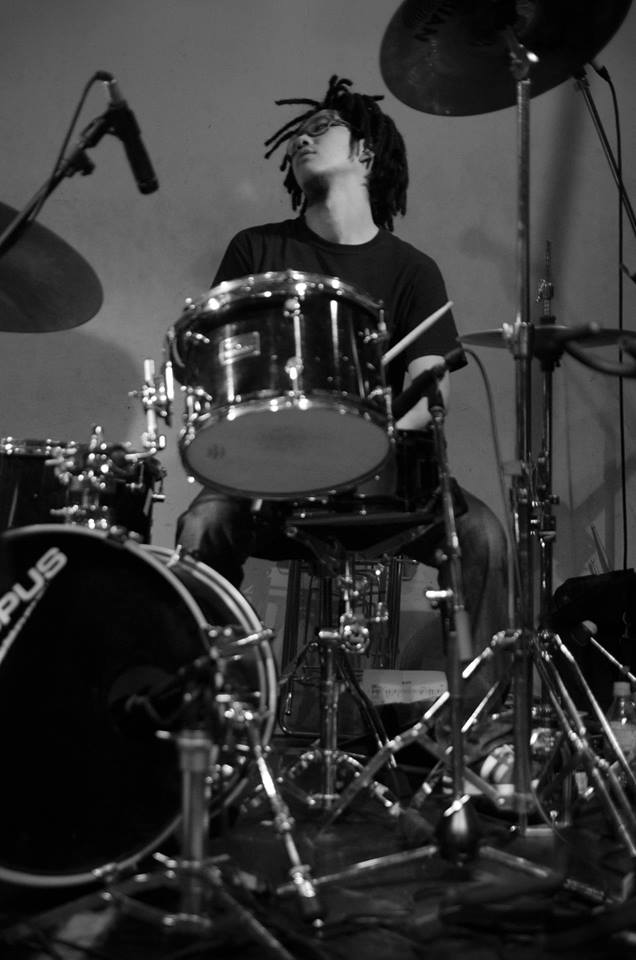
Hirokazu Suyama (photo by Takuma Toyonaga)
THE YURICANE
our theme song of sorts
by YURI KAGEYAMA
“we are one”
We are the Yuricane
We are the Yuricane
The hurricane of poetry
The hurricane of music
We are the Yuricane
Listen to the Yuricane
On tabla and so smooth drumming
The eye tongue ears
Touch of the storm
The Will Calhoun of Japan
Hirokazu Suyama
Listen to the Yuricane
On rock steady bass
He keeps you grounded where you’re headed
Composer arranger
The James Jamerson of Japan
Hiroshi Tokieda
Listen to the Yuricane
On virtuoso guitar
Touching your heart strings
And wearing only geta or cowboy boots
The Stevie Ray Vaughn of Japan
Yuuichiro Ishii
Listen to the Yuricane
We defy definitions
We bulldoze borders
We crash categorizations
We slam stereotypes
We believe in music
We believe in poetry
We are the Yuricane
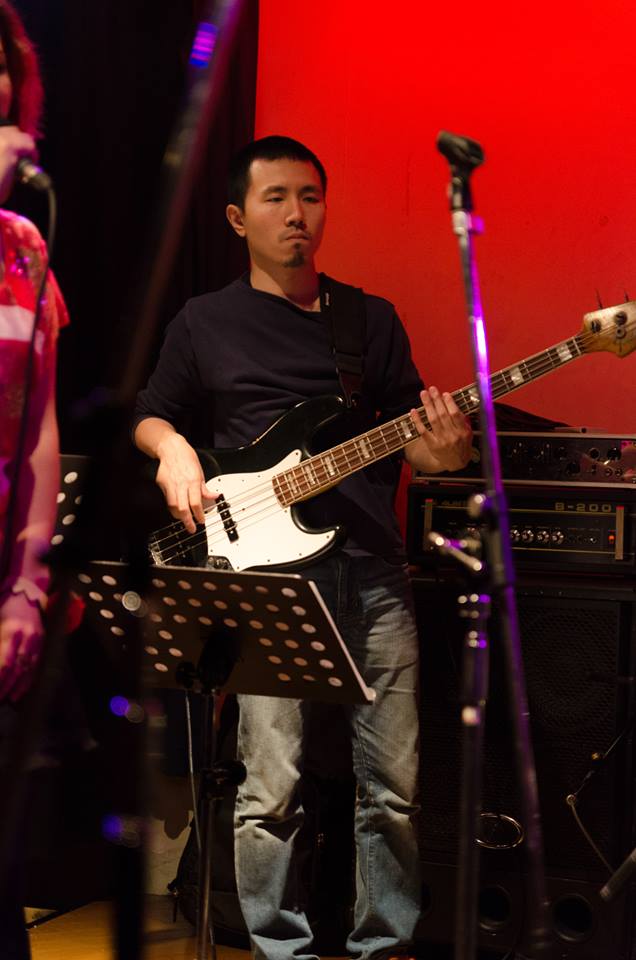
Hiroshi Tokieda (photo by Takuma Toyonaga)

Yuuichiro Ishii
Haiku for Disco _ a poem by Yuri Kageyama
Haiku for Disco _ a poem by Yuri Kageyama
Too Tired, Brain Is Dead
Chukah Thomp, Chukah Thomp, Chukah Thomp,
Disco Is Music.
Some people who know a lot about music look down upon disco because of its simple repetitive rhythm and how the genre has played in to the evil money-making music industry machinery (although other genres have done this, too). What is being overlooked is that this simple repetitive rhythm, which gets people off their seats and out on the dance floor, speaks to people who work hard all day and need to forget, can’t think, but want to groove _ not those academics who want to sit around, focus on more intelligent music to analyze, contemplate and articulate. Call it dumb. Call it what you will. Call it the primordial beat. I am alive. That is what disco music says. And that is the most important thing any music, any art, any writing can say.
(video from Jimmy Clary, via Hiroyuki Shido)
Why the Japanese Love Michael Jackson, an essay by Yuri Kageyama
Why the Japanese Love Michael Jackson
By YURI KAGEYAMA
“MY-keh-rooh,” as Japanese fans adoringly call him, never had to worry about being perceived a wacko-weirdo here _ a culture where neoteny, or the celebration of juvenile traits, and the cross-gender persona, as in effeminate men and masculine women, are at the core of this nation’s highest art forms.
Japanese are used to seeing in its top artists the very traits that some Westerners found so creepy and appalling in Michael Jackson.
It’s not surprising Japanese, long known for their worship of American musicians and movie stars, came out screaming and cheering at sell-out stadiums during Jackson’s “Thriller”-day heights of the 1980s.
But Japanese came out screaming and cheering even in recent years when Jackson was in Tokyo for shopping sprees at gadget stores, visits to Disneyland and Joypolis, an amusement park run by game-maker Sega, and tightly orchestrated events for fans, where he didn’t sing a single note or glide a single Moon-walk.
He was MY-keh-rooh, the gloved man-child, sweet, innocent, pure _ and oh, so “kawaii.”
Kawaii literally translates as “cute.” But the Japanese has none of the connotations of sexuality associated with the word in the West.
An old man, a subcompact car, something as innocuous as an umbrella, digital camera or kitchen utensil, even something grotesque like a horror-film creature can be potentially kawaii.
Kawaii is about the emotion evoked by a child from its parent, and so is linked in the Japanese mind with the most basic and honorable instinct for the preservation of the species.
It is about love. And it is virtuous.
Kawaii-ness is the keystone of artistic sensibilities from as far back as the Edo Period, prevalent in Hokusai woodblock prints. It is very much alive today in “manga” comics filled with doe-eyed heroes, as well as in the Mickey-Mouse parody sculptures and drawings of Takashi Murakami.
By Western standards, kawaii is embarrassingly frivolous _ like an adult being caught clutching a stuffed animal.
But it’s taken very seriously in Japanese art.
So the King of Pop cavorting on amusement-park rides, cuddling Bubbles the chimp, collecting dolls and playing with children are far more easily accepted as normal adult behavior in Japanese culture.
It is aesthetically almost a modern-day “Tale of Genji,” a floating-world quest for the essence of beauty in a child.
Fans worshiped Jackson not only for his obviously dazzling singing and dancing talents.
As neoteny believers, they were able to take at face value without the cynical doubts, more typical of the Western intelligentsia, his “We Are the World” messages on peace and spirituality.
Jackson could do no wrong as a kawaii guy with his soft velvety voice and shy quiet mannerisms, even as his nose changed sizes and his skin changed tones, no matter.
Take any Japanese MJ fan. Ask him or her whether Jackson is kawaii. And the answer would be a definitive “Yes.”
Jackson was a genius at perpetually staying the child. Even in his final photos, he looks pretty kawaii, especially for a man in his 50s.
Jackson was a master at blurring social barriers, and his denials of such definitions went beyond just age: Black, he looks white. Male, he looks so pretty he is asexual.
That is another reason why Jackson has endeared himself to the Japanese psyche.
A womanly male is about as high as one can get in the pinnacle of Japanese art, as evident in the world of Kabuki, where all roles, including those of women, are played by men.
As a counterpoint to this male-oriented theater is the world of Takarazuka, where all roles, including those of men, are played by women.
Japan is still such a sexually divided society, despite the recent advancement of women, people enjoy the escape that art offers in seeing categorizations turned upside down.
Perhaps it can be said that social definitions are so rigid in the mainstream an artist, by definition, is expected to defy them.
In Kabuki, the denials of convention extend to age. An 80-year-old master routinely plays a teen-age village damsel, and a proper Japanese won’t blink an eye.
Akihiro Miwa is an example of a highly respected artist who has made his fame on being a transvestite, the kind of character more common in San Francisco Finnochio’s in the West, not the acclaimed works of Yukio Mishima and Shuji Terayama, in which Miwa was the star.
In his early years, Miwa still looked more or less like a man but wore makeup. These days, he wears evening gowns, sports blonde curls and speaks in the language of women. Japanese love him and seek him out for career advice as though he is a shaman.
Jackson appears rather sedate next to the bejeweled Miwa or the 80-year-old Kabuki master.
Jackson’s death was big news in Japan. But the national mourning was not a splashy loud affair. Fans came out to buy the CDs they still didn’t have in their collection. They watched his videos together at Tower Records. They just wanted to be there, they said, to share that moment with others of like minds. Never mind they had the videos at home.
To the fans, Jackson was a beautiful person.
They became almost weepy when they talked about the allegations of child molestation he had endured. It worked out as a a boon for Jackson that Japanese tend to be mistrustful of the justice system. There are just too many cases of wrongful imprisonment. The first ever jury trial started only in 2009, the year of Jackson’s death.
In one high-profile case, Toshikazu Sugaya, a bus driver, served 17 years of a life sentence after being convicted of charges of murdering a 4-year-old, because of police profiling him as a pedophile, as well as because of coerced confessions that experts say are common in this nation’s police investigations.
Sugaya was released in 2009, after a long legal struggle, and only after DNA tests proved his innocence. Japanese suspect there are many like Sugaya in the prisons, and he was just lucky he had DNA tests.
Jackson was acquitted of all charges in 2005.
Media reports surfaced shortly before his death that Jackson had shown an interest in a young Japanese gymnast and had wanted to meet her.
Perhaps they would have married, some speculative but excited reports suggested _ if only he hadn’t died.
It would have been a marriage made in heaven for Japan.
In true exaltation, we could have witnessed Jackson obliterate yet another painful divisive barrier _ that of insider vs. outsider, or the Japanese vs. the “gaijin” foreigner.
By taking a Japanese wife, he would have almost turned Japanese, becoming one of us.
a message to children
a message to children
by YURI KAGEYAMA
Children, it is a myth that loving someone is this fairy tale.
It’s just pain that defies logic.
If we chose a person to love by logic or by weighing advantages, that won’t be love.
But whatever that essence in our soul that makes us love _ despite how foolish and painful and useless it is _ is what drives music, poetry, life, art, meaning.
It’s like this: No matter what your child is who is born to you, no matter how sick or disabled, male or female or in-between, no matter, it doesn’t matter, you as a mother would instantly love that child.
So if one loves another adult as partner, friend, collaborator, roommate, lover, it is, in principle, no different.
If you were giving to get something out of it, that wouldn’t be love, just a contract.
That’s why love is not even really needed for survival, which is about other things.
Love is so filled with suffering, so unrewarding and draining in its own right, it is utter madness.
So, children, go out and love this world.
blank spaces over generations _ a poem by Yuri Kageyama
blank spaces over generations
a poem by Yuri Kageyama
my father was
slapped for
buying a
book of
poems
that his father
thought was
a rip-off _
so many
blank spaces
on
each
page
i was
a poet
long before i
became
anything else
so i didn’t
worry about
money or how i
was going
to make a living or
all the
blank
spaces
my son is
a drummer
he doesn’t yet
know the
blank spaces
of the world
are a gift
from that
grandfather
who was beaten for
a book
of
poems
Poetry with Music at Tokyo Woodstock
Poet YURI KAGEYAMA
reading “ode to the stoller” and “Little YELLOW Slut”
with the Yuricane
_ Hirokazu Suyama (drums), Hiroshi Tokieda (bass), Yuuichiro Ishii (guitar) and Winchester Nii Tete (kpanlogo drums)
at Tokyo Woodstock 2013 at What the Dickens,
Film by Luis Silva.
July 21, 2013.
ode to the stroller
a poem by Yuri Kageyama
we zip weightless like silent angels
up and down San Francisco hills
running on the mother of all energy
greener than solar
rolling rolling rolling
with laughter
cream acid rock ‘n’ rolling
lightning dazzling wheels
gara-gara-gara-gara
teethers jangling dangling dancing
going mad on strangle-free rubbery ribbons
up and down the Avenues
J-town, Clement Street
Golden Gate Park
Museum of Modern Art
we are singing:
“Ouma no oyako wa nakayoshi koyoshi
itsudemo issho ni pokkuri pokkuri aruku”
perfume wind in our hair
springing over potholes
not even stopping just for breast feeds
connected as one through this magical machine
me pushing
you riding
the Lamborghini of strollers
the Gundam of strollers
the little train that could of strollers
up up up into the joyous clouds
zooming wheeeeee
down slurping slopes
around swervacious curves
we are one
yes, we are one
tied in the past with our
umbilical cord
and
even in death
in our dreams
Little YELLOW Slut
a poem by Yuri Kageyama
first published in KONCH MAGAZINE, 2009.
You know her:
That Little YELLOW Slut, proudly gleefully
YELLOW-ly hanging on Big Master’s arm,
War bride, geisha,
GI’s home away from home,
Whore for last samurai,
Hula dancer with seaweed hair,
Yoko Ohno,
Akihabara cafe maid,
Hi-Hi Puffy Ami/Yumi,
Kawaiiii like keitai,
Back-up dancer for Gwen Stefani,
Your real-life Second Life avatar
Eager to deliver your freakiest fetish fantasies,
Disco queen, skirt up the crotch,
Fish-net stockings, bow-legged, anorexic, raisin nipples, tip-toeing Roppongi on
Stiletto heels.
Yessu, i spikku ingrishhu, i raikku gaijeeen, they kiss you,
hold your hand, open doors for me,
open legs for you, giggling pidgin, covering mouth,
so happy to be
Little YELLOW Slut.
Everybody’s seen her:
That Little YELLOW Slut, waiting at
Home, cooking rice, the Japanese
Condoleezza Rice,
Smelling of sushi,
Breath and vagina,
Fish and vinegar,
Fermented rice,
Honored to be
Cleaning lady,
Flight attendant for Singapore Airlines,
Charlie Chan’s Angel,
Nurse maid, gardener, Japan-expert’s wife,
Mochi manga face,
Yodeling minyo, growling enka,
Sex toy, slant-eyes closed, licking, tasting, swallowing STD semen,
Every drop.
Yessu, i wanna baby who looohkuh gaijeen, double-fold eye, translucent skin, international school PTA,
maybe grow up to be fashion model, even joshi-ana,
not-not-not happy to be
Little YELLOW Slut.
I recognize her:
That Little YELLOW Slut, rejecting
Japanese, rejected by Japanese,
Ashamed,
Empty inside,
They all look alike,
Faceless, hoping to forget, escape
To America,
Slant-eyed clitoris,
Adopted orphan,
Dream come true for pedophiles,
Serving sake, pouring tea, spilling honey,
Naturalized citizen,
Buying Gucci,
Docile doll,
Rag-doll, Miss Universe, manic harakiri depressive, rape victim, she is
You, she is me.
Hai, hai, eigo wakarimasen, worship Big Master for mind, matter, muscle, money, body size correlates to penis size,
waiting to be sexually harassed, so sorry, so many,
so sad to be
Little YELLOW Slut.
TOKYO WOODSTOCK
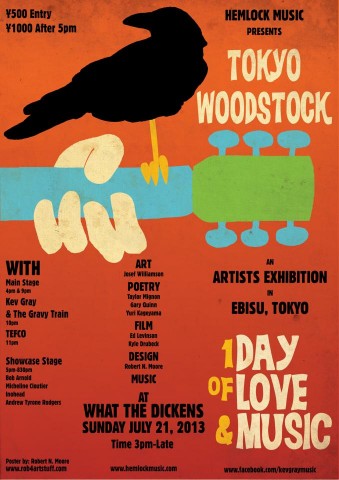
Woodstock, Tokyo, Boston, Accra, the Primordial World of My Poetry _ Lots of Places and Spaces involved.
Come and Explore with us at What the Dickens.
A Multicultural Multiplatform event organized by Kev Gray.
My Yuricane Band featuring the Best and Brightest from the Berklee College of Music and from the Addy/Amo/Boye Master Musicians Family of Ghana:
Hirokazu Suyama (drums, percussion, musical direction), Hiroshi Tokieda (bass), Yuuichiro Ishii (guitar) and Winchester Nii Tete (kpanlogo drums).
We challenge boundaries with integrity.
LOOKING AT FUKUSHIMA
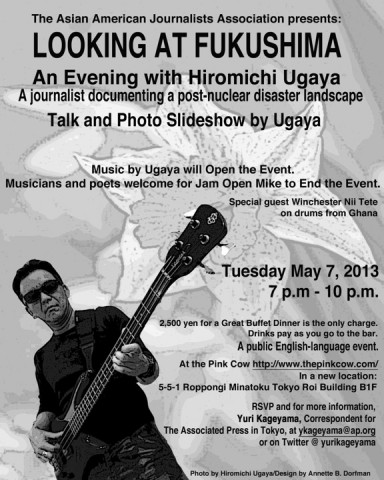
The Asian American Journalists Association presents
“LOOKING AT FUKUSHIMA _ An Evening with Hiromichi Ugaya,”
a talk, photo slideshow and discussion session with a veteran journalist documenting a post-nuclear disaster landscape.
THE PINK COW
5-5-1 Roppongi Minatoku Tokyo Roi Building B1F
TUESDAY May 7, 2013 7 p.m. – 10 p.m.
2,500 yen for a Great Buffet is the only charge. Drinks pay as you go at the bar.
A public English-language event.
Come on time to catch a musical performance opening the event.
Musicians and poets welcome for Jam Open Mike to close the event.
Hiromichi “Hiro” UGAYA is a veteran journalist, photographer and educator, who has devoted his life recently to intensive coverage of the Fukushima nuclear catastrophe and the plight of the tens of thousands of people the accident has displaced. A former reporter at Asahi newspaper and writer for AERA magazine, he has authored more than half a dozen books on security issues, media criticism, Internet technology and Japanese pop culture. A graduate of Kyoto University, he holds a Master’s in International Security Affairs from Columbia University. His latest book “Fukushima’s Lost Seasons” is a poetic photo essay of the serene flowers and trees of the region that have been invisibly devastated by radiation. He is also a bassist and performs regularly at Tokyo clubs.
Dec. 12, 2012, The Very Special Day _ a Prose Poem by Yuri Kageyama
Dec. 12, 2012, The Very Special Day
_ a Prose Poem by Yuri Kageyama published in the October 2013 issue of KONCH magazine, edited by Ishmael and Tennessee Reed.
My birthday this year is so very special because Dec. 12, 2012 is that one day that goes 12-12-12, and that can happen only once and there is no 13-13-13.
I am going to be six years old on this so very special day.
And so everyone knows this is so very special, especially Mama who keeps saying it will be so very special.
I started having birthdays when I started going to ABC Pre-School. I guess I had them before, but I was so little like a baby so I don’t remember those birthdays.
My friends from ABC Pre-School came over for my birthday and we had a Pinata. That’s a little blue and pink horse, but it’s made of paper and so we take plastic baseball bats and we keep hitting it and hitting it and hitting it, and it’s got lots and lots of candy inside it.
Then Mama did a special quiz with questions like: What’s yellow, cuddled together and good?
And my friends said things like Sponge Bob, but I knew the right answer was French Fries because Mama and I go to the acquarium when it’s free to get inside, and that’s what we get each time _ French Fries.
It was funny because every question like that, I knew all the answers right away.
Then we had cake and ice cream.
I got presents. I got a car and a spaceship and a book and coloring pens and so many things.
One of my friends wanted to take the spaceship home, just to borrow for a while, and I said OK, but his Mama said No, that’s for your friend who doesn’t have that many toys and you have so many toys at home.
What a very special day.
Then last year, that’s when we moved to Japan, and the birthday was still so very special, Mama said, and we invited friends at Blue Bird Kindergarten, but everyone was too busy on Dec. 12, 2011, and only two little boys came.
But it was still so very special.
I don’t know why Mama was acting so angry about everyone was too busy, and she said it wasn’t that they were busy at all, but because they didn’t like us because we were Japanese American and not Japanese, and our neighbors didn’t like it that Mama worked because all the other Mama’s stayed at home and did housework.
I think it is sad that Mama works all the time, and she should be like all the other Mama’s.
But like she says she is working to feed me and buy my sneakers and put a roof over our heads so I think it is OK.
We still had cake and ice cream, and we wore very special hats that Mama made out of green and blue and red paper with sparkly stars on them and so I was proud to wear my special hat. I got two presents from those two little boys who came.
I don’t know what is going to happen on Dec. 12, 2012, like I said the 12-12-12 is a very special day, but Mama says we are going to make it special just by ourselves this time.
She looked angry again when she said this and also like she was going to cry and I felt like I was going to cry, too, though I don’t know why because we are talking about a very special day, and that’s a happy thing.
So I thought about what could be a very special day for Mama, and so I asked her: “Mama, what would you like to do on your funeral?”
Mama stopped moving all of a sudden, and I thought she might even spank me because it was so all of a sudden, though she hardly ever ever ever spanks me.
That was how sudden it was.
Then she went back to normal and said, “I want a lot of beautiful music.”
So I said very quickly to catch up with her suddenness, “Mama, I will play that music. I will.”
Then she reached out and hugged me, and she smelled like soap and my favorite blanket and maybe some food we are going to eat at dinner, and I felt happy again and warm inside.
As I was buried in that warmness and happiness, she whispered: On your birthday, we are going to go and get presents for ourselves.
You know where it is?
No, I said.
They are in the sky. The dots of light in the sky.
Oh, Mama, you mean the stars. They can be our presents?
Yes, she says, they are there for us to keep, but you have to be a good boy, and you can keep only one.
You can have one, too, Mama.
Thank you.
She says she is thinking about taking one of the two blue stars that are always together, and I know which ones she means because we go look outside our balcony at the stars and sometimes on weekends at the beach, where you can see them better.
I know she is hoping I will take the other blue star.
I don’t know why I know but I know. Maybe the same way I knew the right answer was French Fries.
It would be nice to be the two blue stars in the sky, always together _ Mama and me.
They aren’t really blue, they are kind of white, maybe dim and blending into the midnight blue-black of the sky, more blue than the other ones that look yellow or pink or really, really white.
I don’t know why, but, when I speak, I say something different.
Mama, I want the red big one, you know, the one that hangs low in the sky, like it’s waiting for something to happen, so quiet and almost evil, but filled with the power of making everything in the world good.
Mama doesn’t stop. Oh, that’s a good choice, she says without a blink of hesitation.
That big red star is just like you. I will be those two blue stars on the other side of the sky, like eyes, always watching from afar.
Please watch, Mama, I say.
We hug and cuddle close.
It is a very special day already.